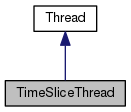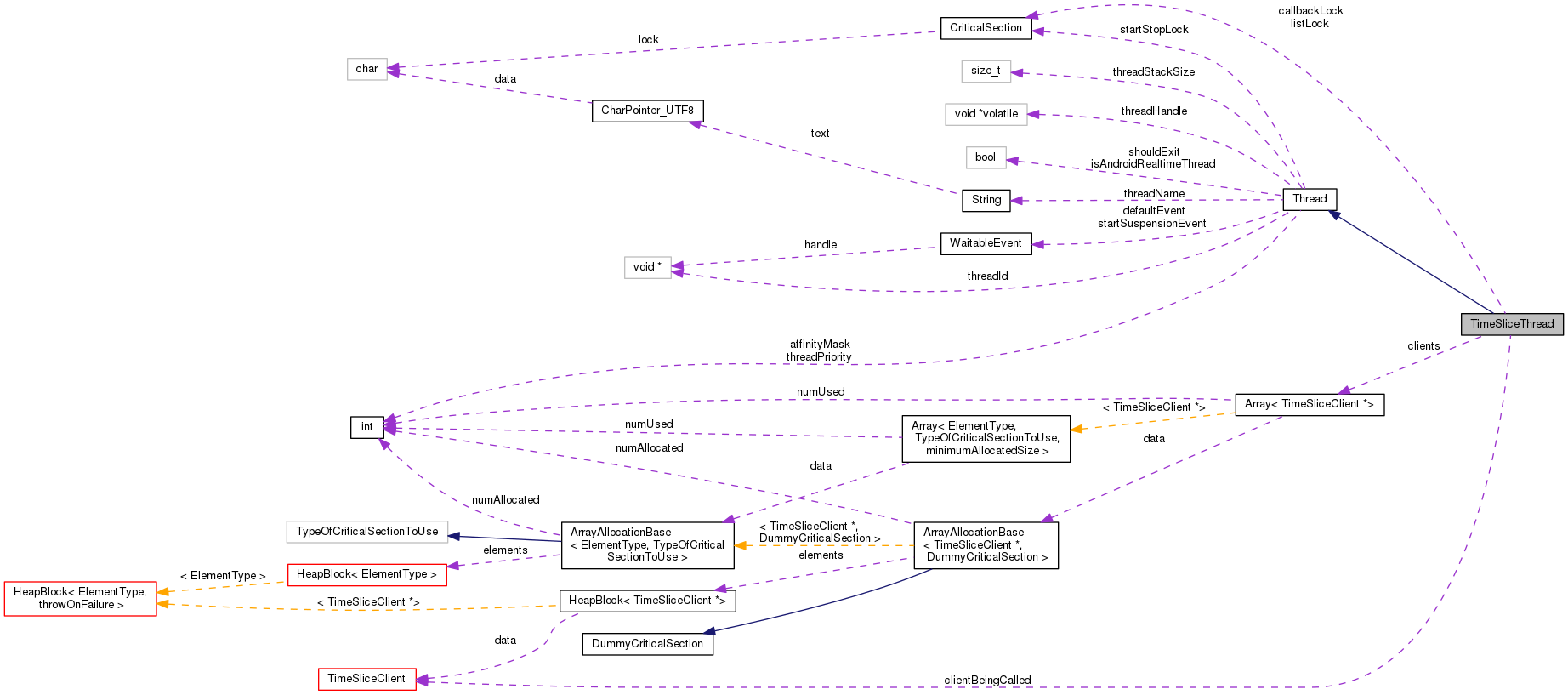A thread that keeps a list of clients, and calls each one in turn, giving them all a chance to run some sort of short task.
More...
#include <juce_TimeSliceThread.h>
A thread that keeps a list of clients, and calls each one in turn, giving them all a chance to run some sort of short task.
- See also
- TimeSliceClient, Thread
◆ ThreadID
◆ anonymous enum
Special realtime audio thread priority.
This priority will create a high-priority thread which is best suited for realtime audio processing.
Currently, this priority is identical to priority 9, except when building for Android with OpenSL support.
In this case, JUCE will ask OpenSL to consturct a super high priority thread specifically for realtime audio processing.
Note that this priority can only be set before the thread has started. Switching to this priority, or from this priority to a different priority, is not supported under Android and will assert.
For best performance this thread should yield at regular intervals and not call any blocking APIS.
- See also
- startThread, setPriority, sleep, WaitableEvent
| Enumerator |
|---|
| realtimeAudioPriority | |
◆ TimeSliceThread()
| TimeSliceThread::TimeSliceThread |
( |
const String & |
threadName | ) |
|
|
explicit |
◆ ~TimeSliceThread()
| TimeSliceThread::~TimeSliceThread |
( |
| ) |
|
Destructor.
Deleting a Thread object that is running will only give the thread a brief opportunity to stop itself cleanly, so it's recommended that you should always call stopThread() with a decent timeout before deleting, to avoid the thread being forcibly killed (which is a Bad Thing).
◆ addTimeSliceClient()
| void TimeSliceThread::addTimeSliceClient |
( |
TimeSliceClient * |
clientToAdd, |
|
|
int |
millisecondsBeforeStarting = 0 |
|
) |
| |
Adds a client to the list.
The client's callbacks will start after the number of milliseconds specified by millisecondsBeforeStarting (and this may happen before this method has returned).
◆ currentThreadShouldExit()
| static bool Thread::currentThreadShouldExit |
( |
| ) |
|
|
staticinherited |
Checks whether the current thread has been told to stop running.
On the message thread, this will always return false, otherwise it will return threadShouldExit() called on the current thread.
- See also
- threadShouldExit
◆ getClient()
Returns one of the registered clients.
◆ getCurrentThread()
| static Thread* Thread::getCurrentThread |
( |
| ) |
|
|
staticinherited |
Finds the thread object that is currently running.
Note that the main UI thread (or other non-Juce threads) don't have a Thread object associated with them, so this will return nullptr.
◆ getCurrentThreadId()
◆ getNextClient()
◆ getNumClients()
| int TimeSliceThread::getNumClients |
( |
| ) |
const |
Returns the number of registered clients.
◆ getThreadId()
Returns the ID of this thread.
That means the ID of this thread object - not of the thread that's calling the method.
This can change when the thread is started and stopped, and will be invalid if the thread's not actually running.
- See also
- getCurrentThreadId
◆ getThreadName()
| const String& Thread::getThreadName |
( |
| ) |
const |
|
inlineinherited |
Returns the name of the thread.
This is the name that gets set in the constructor.
References JUCE_CALLTYPE.
◆ isThreadRunning()
| bool Thread::isThreadRunning |
( |
| ) |
const |
|
inherited |
Returns true if the thread is currently active.
◆ moveToFrontOfQueue()
If the given client is waiting in the queue, it will be moved to the front and given a time-slice as soon as possible.
If the specified client has not been added, nothing will happen.
◆ notify()
| void Thread::notify |
( |
| ) |
const |
|
inherited |
Wakes up the thread.
If the thread has called the wait() method, this will wake it up.
- See also
- wait
◆ removeAllClients()
| void TimeSliceThread::removeAllClients |
( |
| ) |
|
Removes all the active and pending clients from the list.
This method will make sure that all callbacks to clients have finished before the method returns.
◆ removeTimeSliceClient()
| void TimeSliceThread::removeTimeSliceClient |
( |
TimeSliceClient * |
clientToRemove | ) |
|
Removes a client from the list.
This method will make sure that all callbacks to the client have completely finished before the method returns.
◆ run()
| virtual void Thread::run |
( |
| ) |
|
|
pure virtualinherited |
◆ setAffinityMask()
| void Thread::setAffinityMask |
( |
uint32 |
affinityMask | ) |
|
|
inherited |
Sets the affinity mask for the thread.
This will only have an effect next time the thread is started - i.e. if the thread is already running when called, it'll have no effect.
- See also
- setCurrentThreadAffinityMask
◆ setCurrentThreadAffinityMask()
| void Thread::setCurrentThreadAffinityMask |
( |
uint32 |
affinityMask | ) |
|
|
staticinherited |
◆ setCurrentThreadName()
| void Thread::setCurrentThreadName |
( |
const String & |
newThreadName | ) |
|
|
staticinherited |
◆ setCurrentThreadPriority()
| static bool Thread::setCurrentThreadPriority |
( |
int |
priority | ) |
|
|
staticinherited |
Changes the priority of the caller thread.
Similar to setPriority(), but this static method acts on the caller thread. May return false if for some reason the priority can't be changed.
- See also
- setPriority
◆ setPriority()
| bool Thread::setPriority |
( |
int |
priority | ) |
|
|
inherited |
Changes the thread's priority.
May return false if for some reason the priority can't be changed.
- Parameters
-
| priority | the new priority, in the range 0 (lowest) to 10 (highest). A priority of 5 is normal. |
- See also
- realtimeAudioPriority
◆ signalThreadShouldExit()
| void Thread::signalThreadShouldExit |
( |
| ) |
|
|
inherited |
Sets a flag to tell the thread it should stop.
Calling this means that the threadShouldExit() method will then return true. The thread should be regularly checking this to see whether it should exit.
If your thread makes use of wait(), you might want to call notify() after calling this method, to interrupt any waits that might be in progress, and allow it to reach a point where it can exit.
- See also
- threadShouldExit
-
waitForThreadToExit
◆ sleep()
| void Thread::sleep |
( |
int |
milliseconds | ) |
|
|
staticinherited |
◆ startThread() [1/2]
| void Thread::startThread |
( |
| ) |
|
|
inherited |
Starts the thread running.
This will cause the thread's run() method to be called by a new thread. If this thread is already running, startThread() won't do anything.
- See also
- stopThread
◆ startThread() [2/2]
| void Thread::startThread |
( |
int |
priority | ) |
|
|
inherited |
Starts the thread with a given priority.
Launches the thread with a given priority, where 0 = lowest, 10 = highest. If the thread is already running, its priority will be changed.
- See also
- startThread, setPriority, realtimeAudioPriority
◆ stopThread()
| bool Thread::stopThread |
( |
int |
timeOutMilliseconds | ) |
|
|
inherited |
Attempts to stop the thread running.
This method will cause the threadShouldExit() method to return true and call notify() in case the thread is currently waiting.
Hopefully the thread will then respond to this by exiting cleanly, and the stopThread method will wait for a given time-period for this to happen.
If the thread is stuck and fails to respond after the time-out, it gets forcibly killed, which is a very bad thing to happen, as it could still be holding locks, etc. which are needed by other parts of your program.
- Parameters
-
| timeOutMilliseconds | The number of milliseconds to wait for the thread to finish before killing it by force. A negative value in here will wait forever. |
- Returns
- true if the thread was cleanly stopped before the timeout, or false if it had to be killed by force.
- See also
- signalThreadShouldExit, threadShouldExit, waitForThreadToExit, isThreadRunning
◆ threadShouldExit()
| bool Thread::threadShouldExit |
( |
| ) |
const |
|
inlineinherited |
Checks whether the thread has been told to stop running.
Threads need to check this regularly, and if it returns true, they should return from their run() method at the first possible opportunity.
- See also
- signalThreadShouldExit, currentThreadShouldExit
◆ wait()
| bool Thread::wait |
( |
int |
timeOutMilliseconds | ) |
const |
|
inherited |
Makes the thread wait for a notification.
This puts the thread to sleep until either the timeout period expires, or another thread calls the notify() method to wake it up.
A negative time-out value means that the method will wait indefinitely.
- Returns
- true if the event has been signalled, false if the timeout expires.
◆ waitForThreadToExit()
| bool Thread::waitForThreadToExit |
( |
int |
timeOutMilliseconds | ) |
const |
|
inherited |
Waits for the thread to stop.
This will waits until isThreadRunning() is false or until a timeout expires.
- Parameters
-
| timeOutMilliseconds | the time to wait, in milliseconds. If this value is less than zero, it will wait forever. |
- Returns
- true if the thread exits, or false if the timeout expires first.
◆ yield()
Yields the calling thread's current time-slot.
◆ callbackLock
◆ clientBeingCalled
◆ clients
◆ listLock
The documentation for this class was generated from the following file:

